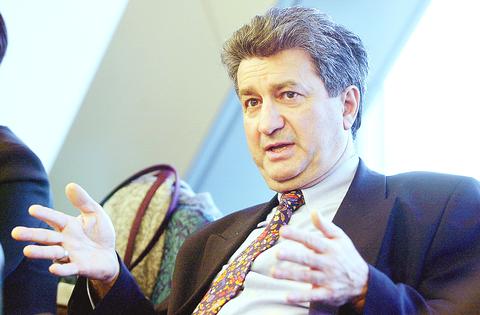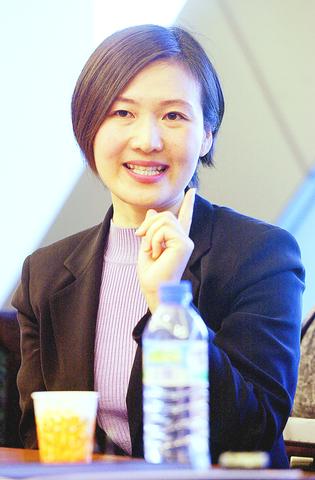While the financial markets are panicking over a flurry of negative economic figures, a leading investment bank painted a rather upbeat picture over the economy yesterday.
JP Morgan believes that the domestic economy -- now slowing at an unprecedented pace, thanks to the slumping high-tech sector -- may rebound in the second half. And the NT dollar, they predicted, may also remain "relatively stable" compared to its Asian counterparts.
"The reason why we have a sharp rebound in the second quarter is because there is the confidence factor -- if a rebound occurs, it could be quite sharp as well," said Joan Zheng, Hong Kong-based senior economist for Greater China with JP Morgan. "But the key thing is the external environment."

PHOTO: CHEN CHENG-CHANG, TAIPEI TIMES
Taiwan may see a "V-shaped recovery," which suggests a sharp recovery in the second half -- assuming that external conditions improve and Taiwan's Central Bank of China cuts interest rates, she said.
Interest rates were, in fact, lowered yesterday.
JP Morgan expects the domestic economy to grow by 3.5 percent this year against government estimates of between 4 percent and 5 percent.

PHOTO: CHEN CHENG-CHANG, TAIPEI TIMES
Taiwan's economic growth this year is unable to match the rapid growth rates of other regional economies.
"What does not go down, does not come up," said Bijan Aghevli, head of Asia-Pacific Economic and Policy Research for JP Morgan.
But the slowdown may be a blessing in disguise if that helps spur corporate and banking sector restructuring.
"We should not underestimate the challenges [of restructuring] in whichever economy we are talking about," Zheng said.
Meanwhile, most currencies in the region may continue to maintain a "weak tone in the short-term, but the NT dollar may be relatively stable," Aghevli said.
The investment bank expects the US economy to grow by 1.5 percent this year, down from last year's 5 percent. US Fed chief Alan Greenspan has adequate tools at his disposal, Aghevli said. The bank expects a 50-basis-point rate cut during the next meeting of the Federal Open Market Committee meeting on March 28.
Despite the weak outlook for technology stocks, investors should not exaggerate the impact of the "negative wealth effect" -- which means the drop in stock prices will lead to lower consumption.
"We recognize the impact of the drop in stock prices on consumer spending and consumer confidence," Zheng said. "But the conclusion is that we should not get carried away."
Nevertheless, a continued weakening in corporate earnings, increased joblessness and lackluster stock prices are likely to eat into private consumption. The good news is that the current slowdown does not augur the end of the new economy, Aghevli said.
"The decline in the US economy is a cyclical situation and it may not be V shaped, but a prolonged U shape. That is why we are optimistic. As we look forward, we will see potential growth in 2002," he said.
But Japan may be less fortunate, he said, as it has no policy flexibility, because its interest rates are already near zero and it possesses a high budget deficit, which now stands at 10 percent of the GDP.

AI BOOST: Although Taiwan’s reliance on Chinese rare earth elements is limited, it could face indirect impacts from supply issues and price volatility, an economist said DBS Bank Ltd (星展銀行) has sharply raised its forecast for Taiwan’s economic growth this year to 5.6 percent, citing stronger-than-expected exports and investment linked to artificial intelligence (AI), as it said that the current momentum could peak soon. The acceleration of the global AI race has fueled a surge in Taiwan’s AI-related capital spending and exports of information and communications technology (ICT) products, which have been key drivers of growth this year. “We have revised our GDP forecast for Taiwan upward to 5.6 percent from 4 percent, an upgrade that mainly reflects stronger-than-expected AI-related exports and investment in the third

Mercuries Life Insurance Co (三商美邦人壽) shares surged to a seven-month high this week after local media reported that E.Sun Financial Holding Co (玉山金控) had outbid CTBC Financial Holding Co (中信金控) in the financially strained insurer’s ongoing sale process. Shares of the mid-sized life insurer climbed 5.8 percent this week to NT$6.72, extending a nearly 18 percent rally over the past month, as investors bet on the likelihood of an impending takeover. The final round of bidding closed on Thursday, marking a critical step in the 32-year-old insurer’s search for a buyer after years of struggling to meet capital adequacy requirements. Local media reports

TECHNOLOGICAL RIVALRY: The artificial intelligence chip competition among multiple players would likely intensify over the next two years, a Quanta official said Quanta Computer Inc (廣達), which makes servers and laptops on a contract basis, yesterday said its shipments of artificial intelligence (AI) servers powered by Nvidia Corp’s GB300 chips have increased steadily since last month, should surpass those of the GB200 models this quarter. The production of GB300 servers has gone much more smoothly than that of the GB200, with shipments projected to increase sharply next month, Quanta executive vice president Mike Yang (楊麒令) said on the sidelines of a technology forum in Taipei. While orders for GB200 servers gradually decrease, the production transition between the two server models has been

ASE Technology Holding Co (日月光投控), the world’s largest integrated circuit (IC) packaging and testing supplier, yesterday announced a strategic collaboration with Analog Devices Inc (ADI), coupled with the signing of a binding memorandum of understanding. Under the agreement, ASE intends to purchase 100 percent shares of Analog Devices Sdn Bhd and acquire its manufacturing facility in Penang, Malaysia, a press release showed. The ADI Penang facility is located in the prime industrial hub of Bayan Lepas, with an area of over 680,000 square feet, it said. In addition, the two sides intend to enter into a long-term supply agreement for ASE to